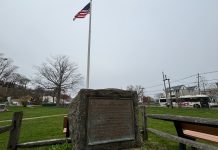By Michaela Boneva |
LINCROFT – Students are forever wondering how math is relevant in the real world, for problems beyond science and engineering. Five High Technology High School students – Yihan “Wendy” Wu, Eric Chai, Steven Liu, Kyle Lui and Adithya Paramasivam – have learned how math truly can be applied to real-life issues. Through creativity and math skills, the team of juniors and one senior has advanced to the finals of a major national math competition.
The MathWorks Math Modeling (M3) Challenge is organized by the Society for Industrial and Applied Mathematics based in Philadelphia and sponsored by MathWorks. Each year at the challenge students are encouraged to consider various current issues that our society faces; the students use math modeling to try to find solutions for these problems. For the 12th year of the competition, the problem faced by over 4,175 11th and 12th graders from all around the United States was food scarcity. Once the problem is announced, students are given just 14 hours to use math modeling to address the issue and write a 20-page research paper of their findings. Students aren’t given the problem in advance, but they are given a haiku as a hint. High Tech’s team coach, Raymond Eng, a teacher at the school, guessed the challenge from this haiku.
The problem consisted of three parts: finding out whether a state’s food waste is enough to be repurposed; calculating the amount of food wasted by households of various sizes and incomes; and determining the best ways to repurpose the wasted food. While most teams don’t have enough time to tackle the final part, the High Tech team addressed each part of the problem and finished their paper comfortably within the time frame.
The team’s final solution found there is more than enough food waste to deal with the problem of food scarcity faced by many. The best method for using the waste would give the maximum amount of food in donations to those in need. After that, the food waste would be used for biofuel, animal feed and composting, in that order.
One might think 14 hours in the same place with the same people would grow annoying and tiresome, but the group had a lot of fun with the challenge. They worked diligently and even took a lunch break to eat pineapple pizza and play foosball. The group had completed a 10-hour practice run with a problem from a previous year and had already determined their individual roles and how to manage their time. They prepared further with countless video calls and researching various topics.
High Tech’s team will head to New York City on April 30 for the final part of the competition where they will compete against five other teams from across the country. In this trip, they will be presenting their findings and solutions with the chance to win the grand prize scholarship of $20,000.
Even though Wendy is the only senior on the team, she has really enjoyed the competition so far. “The premise is pretty interesting, to tackle a controversial topic,” she said. “It’s timely.”
This article was first published in the April 19-26, 2018 print edition of The Two River Times.














